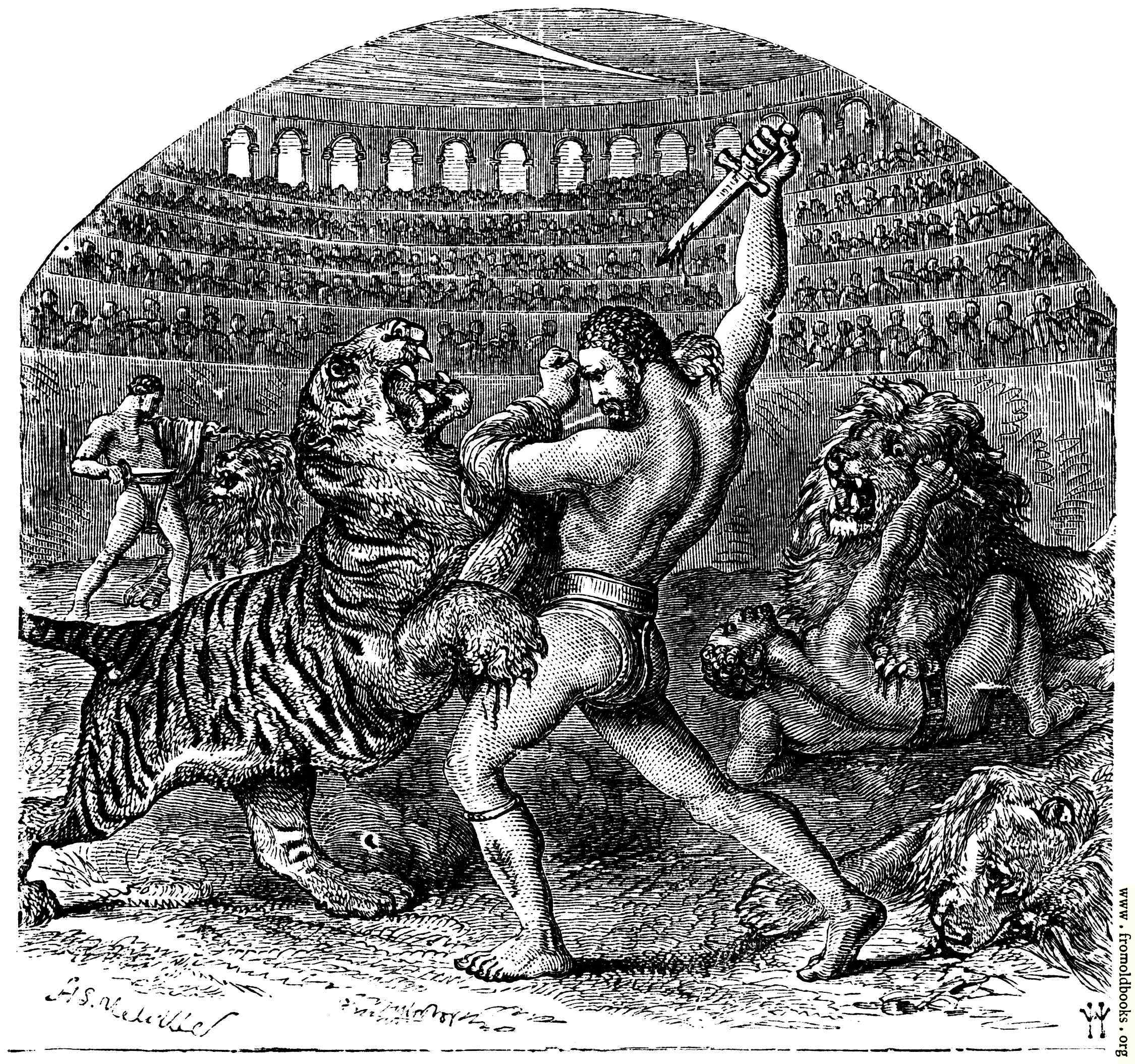Everyone seems to be debating about the status of bullfighting, and while reading
Candide I thought of it, so I might as well just say my opinion. The Romans had fun watching gladiators fight each other or in some cases with animals. Even though it started as a way to humiliate prisoners while the elite had fun, it became an opportunity for these prisoners to move up the social ladder, if they survived. Romans built coliseums all over their territory where, though they had a fancy structure, saw people kill each other in the most sanguinary and savage way. They even brought up exotic animals from their colonies, like elephants, lions, tigers or rhinoceros. The demand for these colossal and imposing grew so much that animals like the European lion became luckily extinct, or near to be in other cases. The Roman Empire ended and its culture dissolved into into its territories as each became its own nation.
 |
| Gladiator fighting a tiger in a coliseum |
While man-to-man gladiators stopped existing, the culture of watching people or animals die and suffer remains up to the present. Candide and Lady Cunégonde end up living in Portugal while the Inquisition was still strong. They witnessed the death of their friend and teacher Pangloss in an auto-da-fé. The story of how that happened is told in the perspectives of both, Candide and Cunégonde. On one side, Candide saw how innocent people were captured by the Portuguese authorities for the sake of having a killing. He was wounded but Pangloss was killed. On the other side, Cunégonde was invited to an honoring seat at the execution where she could enjoy of refreshments. Anyway, when she realized that Pangloss was being killed, everything changed and she felt horrible. The Spanish and Portuguese Inquisitions were the outcome of a lot of things going on at that time, but what opened up the opportunity for it to happen was the savage foundations of these cultures.
 |
| People observing an auto-da-fé in a town's plaza |
In an auto-da-fé heretics were burned usually in the town's plaza as everyone watched and enjoyed. Prisoners sometimes held symbols on their clothes to represent the crimes that had committed. People who went to the ceremony had a feast where they celebrated their Catholicism and culture. Thankfully this doesn't happen anymore but bullfighting does. Although these two things are almost incomparable as one includes religious and political persecution to humans while the other only includes bulls, but they do have similar customs and past. Bullfighting has a similar ceremony to that of a gladiator or an auto-da-fé. People gather around a plaza-like structure where they celebrate, socialize and enjoy a passion. The Roman elite yelled with emotion and what they said could influence what the gladiators did. In bullfighting people can ask the bullfighter to let the bull live in a similar way. People defend bullfighting saying that it is an art, a passion, part of their culture. That sounds to me similar to the acts of faith or auto-da-fé of the Inquisitions, where people went to honor their religion and preserve their culture, as the heretics were damaging it. Bullfighting has an overbearing tradition of procedures and symbols or whatever, as did the Spanish Inquisition.
 |
| A man fighting an animal in a plaza. Sounds similar? |
Recently the new mayor of Bogota, Gustavo Petro, threatened to make bullfighting illegal. I don't sympathize with many of his ideas, but I do with this one. He won't probably carry out his idea, as since he became mayor all he's done is to threaten to do unconventional things in order to raise attention and, in the biased way I see it, to cause social instability to make him raise in politics as a populist. Bullfighting fanatics come up with a lot of arguments, but all I think is that since the Spanish Inquisition or gladiators were cruel and simply bad, they shouldn't have any heritage. We shouldn't celebrate the killing of an animal, even if that creates an industry and the existence of the animal. Bulls are better off unborn than killed for the sake of entertainment. I don't mean to be offensive but the pro-bullfighting arguments have logic as good as the Inquisition had, where they though killing people would prevent an earthquake, like in Pangloss' case.
 |
| Your argument is invalid. |




This comment has been removed by the author.
ReplyDeleteYou must be very passionate about the subject if you insist on including it on your English blog, but I'm glad you did. This topic touches the subject of our human nature. Are we still savages that take pain, danger, and bloodshed as entertainment, or are we beyond that? I think if we were beyond that we wouldn’t find action films bloated with guns and bloodshed entertaining. They have the same principle of suspense and danger bullfighting has; only no one is actually killed. I stand with you on your position, I don't like bullfighting, but I ask myself if thinking that humans are completely civilized and should find events like these repulsive is a little naive. Should we accept our condition of animals wanting to show our superiority through violence and fear or should we think we have become a superior species and therefore disown all forms of violence?
ReplyDelete